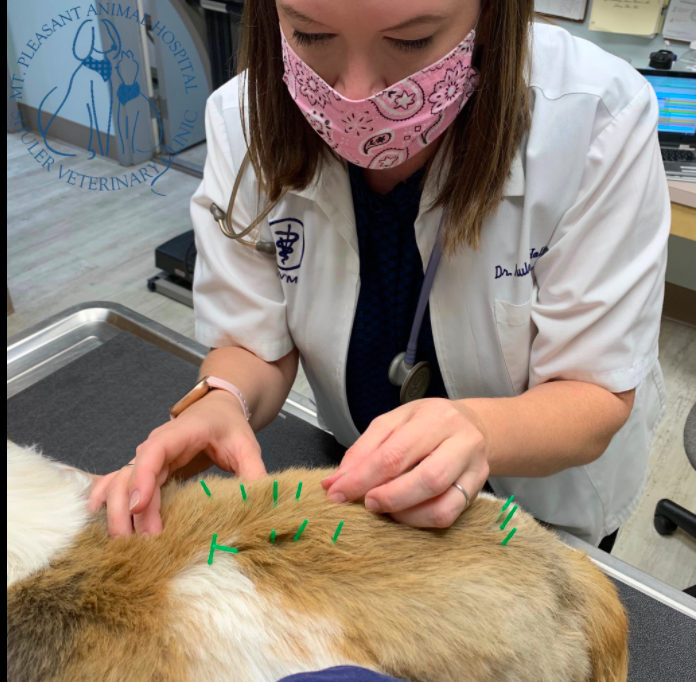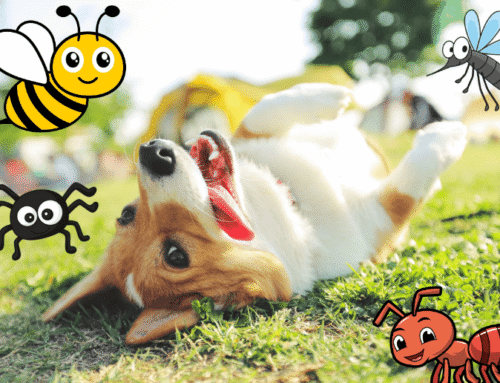Veterinary acupuncture is an ancient but incredibly powerful therapy used to correct internal imbalances, reduce inflammation, and help your pet’s body heal itself. At Mount Pleasant Animal Hospital, we’re proud to offer this time-honored modality along with our modern techniques and technology and to provide your pet with comprehensive and personalized care.
Although acupuncture is one of the oldest Eastern medicine techniques, the concept is still relatively new for U.S. pet owners. Check out the following information to learn if acupuncture is right for your pet.
What is acupuncture for pets?
Acupuncture is an Eastern medicine technique that has been used to treat people and pets in China for thousands of years. Treatment involves inserting hair-thin needles in the skin at specific points on your pet’s body to stimulate a healing response, which may include increased circulation through the area, accelerated cellular waste removal, pain relief, muscle relaxation, or decreased inflammation. Acupuncture’s underlying principle is to enhance or restore the pet’s internal energy flow, or “Qi,” which is unique to each individual pet and a vital life force in each living being.
Will acupuncture replace my pet’s other treatments or medications?
Acupuncture can be used as a stand-alone treatment, but is most commonly recommended as an adjunctive or complementary therapy along with medications, surgery, rehabilitation, or laser therapy. Your pet’s Mount Pleasant Animal Hospital veterinarian will hand-select each treatment to create a strategic synergistic effect—in other words, treatments that are paired together amplify the other’s positive effects.
If your pet responds positively to acupuncture, other therapies—including some medications—may be reduced or discontinued. Although this is the ideal outcome, results will vary for each pet.
Will my pet enjoy acupuncture therapy?
Despite its shocking appearance, most pets accept and appear to appreciate acupuncture. In fact, dogs and cats naturally and frequently fall asleep during their treatment session. Some pets appear to experience initial discomfort during or in response to needle placement, but this reaction is mild and short-lived. If the correct acupuncture points are targeted, your pet will feel no discomfort.
What’s happening beneath my pet’s skin during and after treatment?
Acupuncture may have its roots in ancient medicine, but many of its effects are clinically proven and agreed on by the National Institutes of Health (NIH). The sensation of the acupuncture needles being inserted through the skin stimulates the central nervous system (i.e., your pet’s nerves, spinal cord, and brain) and creates specific neurologic and physiologic changes, including:
- Nerve stimulation
- Muscle spasm relaxation
- Blood and lymph circulation
- Hormone release (e.g., endorphins [i.e., “feel-good” pain relievers] and cortisol, a natural steroid)
Some pets will experience changes immediately, although the most noticeable effects (e.g., improved behavior, energy, mobility) require multiple sessions. Because acupuncture effects are cumulative, we recommend scheduling three to five sessions before deciding if the therapy is benefitting your pet.
Acupuncture applications—senior pets
Acupuncture is a phenomenal treatment modality for senior pets, especially those with chronic pain (e.g., osteoarthritis, orthopedic or intervertebral disc disease) or a progressive health condition (e.g., cancer, degenerative myelopathy, renal failure). Because many effective pain medications are contraindicated for senior pets with compromised organ function, acupuncture can provide effective, non-pharmaceutical pain management.
Acupuncture applications—sick or injured pets
Acupuncture can aid sick and injured pets in countless ways, including immune system support, inflammation reduction, and illness or injury-associated stress and anxiety relief. Since stress and pain are significant barriers to healing, reducing the barriers supports the body and the mind—elevating mood, relieving or reducing clinical illness signs, and accelerating tissue, bone, and joint healing for injured or post-surgical pets.
The full extent of acupuncture uses and benefits are still being discovered. Visit our acupuncture page for a current list of its most common uses.
Acupuncture applications—athletic and working dogs
Sporting and working dogs participate in physically demanding activities that push their bodies to the limit, and these hard-working dogs often mask pain and muscle tension and rely on adrenaline to perform their tasks. Routine acupuncture treatments—along with a formal conditioning program—can reduce soreness, accelerate post-competition recovery, maintain healthy nerve function for fast responses, and increase blood flow to major muscle groups.
What to expect during your pet’s acupuncture appointment
Your pet’s acupuncture consultation begins with a physical examination that incorporates standard assessments and Traditional Chinese Veterinary Medicine (TCVM) techniques. If your pet is a suitable acupuncture patient, the veterinarian will create a customized therapeutic plan that will include treatment goals, targeted areas, and a recommended session frequency.
Acupuncture appointments are pleasant and calm visits for pets and owners. Many pets are treated on the floor while they rest on a comfy bed. After the needles are positioned and inserted, they remain in place for approximately 15 to 30 minutes. Fortunately, most pets are so “zen,” they don’t mind staying still.
Sometimes delivering cutting-edge compassionate veterinary care requires embracing ancient techniques. If you’re interested in learning more about acupuncture or whether your dog or cat is a candidate, contact the pet wellness experts at Mount Pleasant Animal Hospital.








